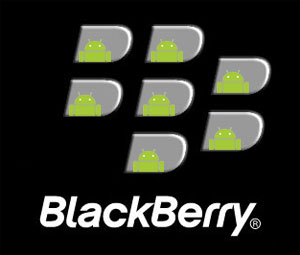Android Apps on the PlayBook: This Doesn’t Change Everything!
By Harry McCracken | Friday, March 25, 2011 at 7:51 pm
 Yesterday, BlackBerry maker RIM confirmed what sounded at first like a wild rumor: Its PlayBook tablet, coming on April 19th, will run Android apps even though it’s not an Android tablet per se. Apps written for Android 2.3 Gingerbread will be another PlayBook option along with native programs written for RIM’s new QNX-based tablet OS and ones built in Adobe AIR.
Yesterday, BlackBerry maker RIM confirmed what sounded at first like a wild rumor: Its PlayBook tablet, coming on April 19th, will run Android apps even though it’s not an Android tablet per se. Apps written for Android 2.3 Gingerbread will be another PlayBook option along with native programs written for RIM’s new QNX-based tablet OS and ones built in Adobe AIR.
As usual with RIM execs, co-CEO Jim Balsillie explained the news in a way that was, um, a bit twisty. (Balsillie and fellow co-CEO Mike Lazaridis have a manner of spelling out their company’s strategies that reminds me of a Choose Your Own Adventure book.) But if I understand Balsillie correctly, he’s saying that the Android compatibility isn’t there as a primary source of apps. People are going to want to run software that’s been designed to take advantage of the PlayBook’s hardware. The large quantities of Gingerbread apps–what he calls “tonnage”–are there in case anyone’s worried that there won’t be enough PlayBook apps, or the right apps for every purpose.
That sounds reasonable enough to me. But it also sounds like it’ll be a distinctly minor aspect of the PlayBook’s, well, playbook.
This is not a new problem, or a new approach to solving it. Actually, for as long as there have been personal computing devices, people have been making them run applications written for other platforms. PC Transporter–which let the Apple II use IBM PC apps–was one earlyish example. Apple’s Boot Camp, Parallels, and VMWare Fusion, all of which permit Windows software to run on Macs, are current ones.
 These products and technologies are always useful for certain types of folks. And they give a larger group of folks a certain degree of comfort. Even if you never actually bother to run Windows programs on a Mac, it’s nice to know you can. It’s a security blanket.
These products and technologies are always useful for certain types of folks. And they give a larger group of folks a certain degree of comfort. Even if you never actually bother to run Windows programs on a Mac, it’s nice to know you can. It’s a security blanket.
Ultimately, though, I can’t think of any examples of alternate-platform compatibility being a big deal. (I’m not counting prior-version compatibility, such as Apple’s enabling of OS X to run OS9 software–that was essential in its time.) It may help sell a few devices at first, but if PlayBook users are stuck depending on Android apps for very long, they’re going to be disappointed–a fact that Balsillie acknowledges almost explicitly. And if the PlayBook gets some decent native apps of its own, the fact that it can run even more Android apps won’t matter much.
I’m also not too worried about the PlayBook’s Android compatibility working against the tablet by leaving developers concluding that providing PlayBook users with Android versions of their apps is good enough. When Apple rolled out Boot Camp, some Macheads feared it would have a detrimental effect on the market for OS X software. But it doesn’t seem to have hurt it a bit.
A year from now, we’ll know whether the PlayBook seems to be a success or a failure. (As I’ve said before, I find it among the most intriguing of iPad alternatives, in part because it reflects distinctly different design decisions and priorities in a way that the Motorola Xoom, say, does not.) Betcha that whatever happens, nobody will conclude that the Android compatibility played more than a minor role in securing the PlayBook’s fate.
2 Comments
Read more:













March 28th, 2011 at 7:05 am
The benefit is a big psychological effect on buyers. Users looking for a 7" android tablet may find the interface more to their liking. Users looking for a playbook for business use won't think their tablet is DOA.
August 25th, 2011 at 6:46 am
I recommend you one of the best playbook apps http://getwebreader.com/playbook-app-store